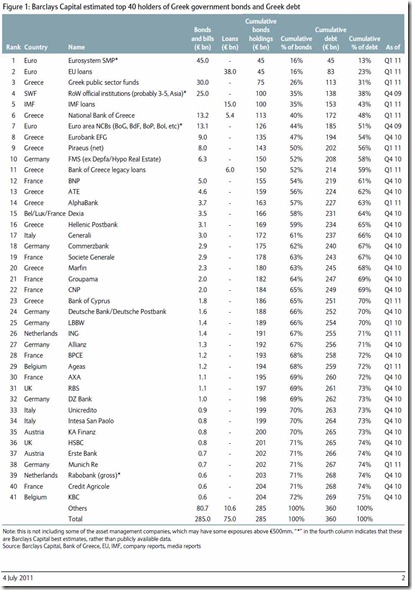Barclays Capital compiled a list of the top holders of Greek debt, revealing who is going potentially to face the biggest problems in the event of default or selective default that is currently under discussion.
To see a description of the top 20 institutions shown in the above list look here.
The conclusions from Barclay’s study are:
“In our previous research on the holders of Greek debt (see for example Euro Themes: Implications of Greece restructuring for banks and CDS, 3 June) we highlighted that these holdings are actually quite concentrated (with the top 30 holders accounting for 70%+ of the total). In this report, we update these numbers and show the details of the biggest holdings on a name-by-name basis. The vast majority of the information comes from disclosures by the companies themselves (for private sector holders, mainly banks and insurance companies), or some official data (for public sector holdings or loans data). In fact, there are only a few holdings that are not up to date as of Q4 10 or Q1 11 or that we have had to estimate (eg, the ECB SMP holdings or some of the central banks holdings, although admittedly, these are probably among the biggest holders). We would also highlight that this data/information has been in the public domain for some time, and so should not be a particular surprise to financial markets, rating agencies and commentators.
The high concentration of holdings, and the type of institutions involved, suggests that some kind of voluntary rollover/Vienna initiative might have more take-up than one might expect at first glance. Having a participation of €25bn in such an initiative (as has been mentioned in the press) over the coming three years seems plausible, in our view.
Certainly, the Greek holders would have a natural incentive to roll over their debt. The Greek pension and social security funds (managed by the Bank of Greece) would clearly be in that case, although it may not have much debt maturing in the coming years. Greek banks are likely to have a mix of maturities in their portfolios, but we would think that probably more than a third of it is maturing in the coming years. One concern on the banks side has been the ECB stance that it would not accept Greek collateral anymore if any private sector involvement was not fully voluntary and/or would trigger a default, and that Greek banks would therefore have to reduce their holdings. We believe one potential way around this would be for the ECB to announce some kind of medium-term ‘addicted banks facility’ that would cover Greek, Irish and some Portuguese banks. This is something the ECB has been mulling for some time, and is linked somewhat to the decision on full allotment in open market operations. Such a facility could provide more security in terms of availability of ECB funding on a medium term to these banks (which will provide or have already provided medium-term liquidity and deleveraging plans to the ECB), and be more flexible in terms of the collateral it accepts than the ‘single list’ that the ECB is using for OMOs (whether or not rolled over debt is considered in default or not seems to vary depending on the rating agency). Such a separate facility would obviously come at a price, in terms of bigger haircuts and potentially a premium interest rate which may be linked to the regular OMOs (which may, or may not, at the same time, revert to variable rate tenders for 3m maturities; the ECB is likely to keep full allotment on the weekly MRO for longer in any case). Over the past few weeks, a number of statements and signs suggest that the ECB might be nearing a decision on this, something which could possibly be announced in September or even earlier (the decision might be precipitated by the downgrade by S&P of Greece and Greek banks to CCC recently). Independently, though, it could be that there would still be the problem of financing of Greek bonds by non Greek holders, if the ECB were to exclude GGBs from its single collateral list (unlikely if there is a simple rollover).
In any event, any additional NPV loss inflicted on Greek banks would require further recapitalisation of these institutions. Under the original EU IMF programme, EUR10bn has been ear-marked for bank recapitalisation. Given the weaker macroeconomic performance and more rapid increase in NPLs than anticipated under the programme, any additional NPV losses associated with public debt rollover at below market rates will require almost a onefor-one capital increase in the context of a new EU/IMF programme.
Rating agencies have been mixed on whether a roll over would constitute a default, a selective default or have limited influence. The bar, though, seems to be quite high for it not to constitute a default on their criteria.
The exact way to involve the private sector and/or do bond rollovers is clearly what the Eurogroup will be focusing on in the coming weeks: this is obviously something that, if done, needs to be done correctly and not rushed through, as a large number of unintended consequences could have a dramatic impact on financial markets. In this regard, we believe different views between Germany and other EU countries on burden sharing by bondholders are likely to be resolved in the coming days, with Germany possibly moving towards the voluntary roll-over proposed by other EU members (and that the ECB appears to support), most likely one based on the principles of the Vienna Initiative.”
